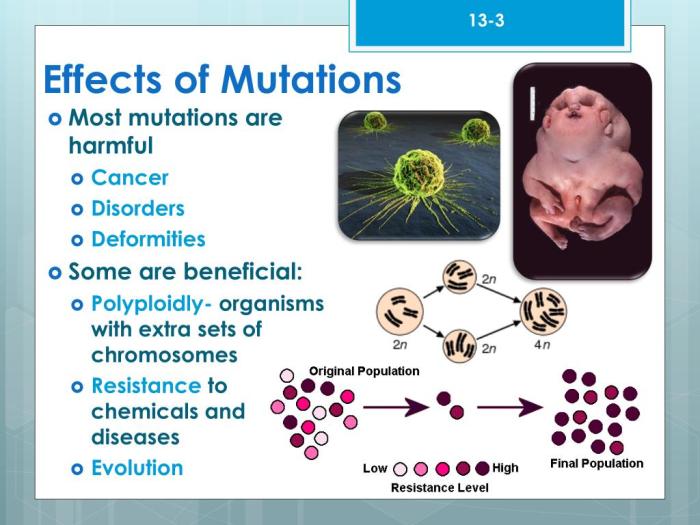Which of the outcomes could potentially result if a mutation? This question sparks a captivating exploration into the realm of genetics, where the consequences of genetic alterations can profoundly shape the destiny of organisms. Join us as we delve into the potential outcomes of mutations, their influencing factors, and their far-reaching implications in medicine, biotechnology, and evolution.
Mutations, the driving force behind genetic diversity, can manifest in a myriad of ways, each with its unique impact on the organism. From gain-of-function to loss-of-function mutations, the consequences can range from beneficial adaptations to debilitating genetic disorders. Understanding these outcomes is paramount to comprehending the intricate workings of life and the potential for genetic interventions.
Potential Outcomes of Mutations

Mutations can have a wide range of outcomes, depending on the type of mutation, the location of the mutation, and the genetic background of the organism. Some mutations can be beneficial, while others can be harmful or even lethal.
| Type of Mutation | Description | Impact |
|---|---|---|
| Gain-of-function mutation | A mutation that results in a new or enhanced function for a gene or protein. | Can be beneficial or harmful, depending on the function of the gene or protein. |
| Loss-of-function mutation | A mutation that results in the loss of function of a gene or protein. | Can be harmful or lethal, depending on the importance of the gene or protein to the organism. |
| Neutral mutation | A mutation that has no effect on the function of a gene or protein. | Does not have any impact on the organism. |
Factors Influencing Mutation Outcomes

The outcome of a mutation can be influenced by a number of factors, including:
- Type of mutation:Some types of mutations are more likely to be harmful than others. For example, frameshift mutations, which insert or delete nucleotides from a gene, are often harmful because they can disrupt the reading frame of the gene and lead to the production of a non-functional protein.
- Location of the mutation:The location of a mutation can also affect its outcome. Mutations that occur in essential genes or in regulatory regions of genes are more likely to be harmful than mutations that occur in non-essential genes or in non-regulatory regions.
- Genetic background of the organism:The genetic background of the organism can also influence the outcome of a mutation. For example, a mutation that is harmful in one organism may be neutral or even beneficial in another organism.
Predicting Mutation Outcomes: Which Of The Outcomes Could Potentially Result If A Mutation

Predicting the outcome of a mutation can be difficult, but there are a number of methods that can be used to make predictions. These methods include:
- Computational methods:Computational methods can be used to predict the effect of a mutation on the structure and function of a protein. These methods can be used to identify mutations that are likely to be harmful or beneficial.
- Animal models:Animal models can be used to study the effects of mutations in a living organism. These studies can provide valuable information about the potential outcomes of mutations in humans.
- Clinical studies:Clinical studies can be used to study the effects of mutations in humans. These studies can provide valuable information about the potential risks and benefits of mutations.
It is important to note that predicting the outcome of a mutation is not always possible. There are a number of factors that can influence the outcome of a mutation, and it is not always possible to predict how these factors will interact.
Implications of Mutation Outcomes
The outcomes of mutations can have a wide range of implications for medicine, biotechnology, and evolution.
- Medicine:Mutations can contribute to genetic diseases, cancer, and drug resistance. Understanding the outcomes of mutations can help us to develop new treatments for these diseases.
- Biotechnology:Mutations can be used to create genetically modified organisms (GMOs). GMOs can be used to produce new products, such as pharmaceuticals and biofuels. Understanding the outcomes of mutations can help us to develop GMOs that are safe and effective.
- Evolution:Mutations are the raw material for evolution. Mutations can lead to new traits that can help organisms to survive and reproduce in their environment. Understanding the outcomes of mutations can help us to understand how evolution works.
Detailed FAQs
What are the potential outcomes of a mutation?
Mutations can lead to a range of outcomes, including gain-of-function, loss-of-function, and neutral mutations, each with its unique impact on the organism.
What factors influence the outcome of a mutation?
The type of mutation, its location, and the genetic background of the organism can all influence the severity and consequences of a mutation.
How can we predict the outcomes of a mutation?
Predicting mutation outcomes is challenging but can be aided by analyzing the type of mutation, its location, and the organism’s genetic background.
What are the implications of different mutation outcomes?
Different mutation outcomes have implications for medicine, biotechnology, and evolution, contributing to genetic diseases, cancer, drug resistance, and driving evolutionary change.